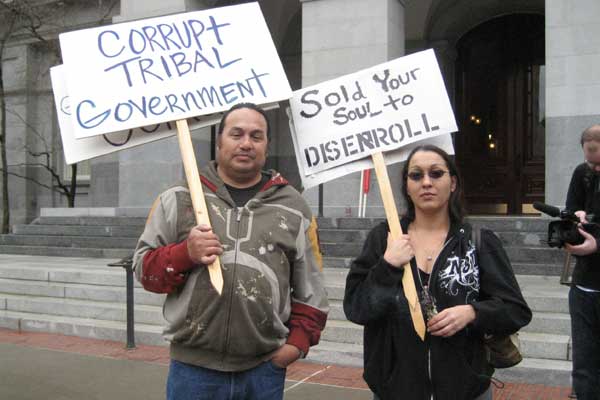The Native Californian Protest Against Tribal Disenrollment
 |
|
by Chloe Auletta-Young/PNN On February 5th, 2009, I approached the State Capital in Sacramento for the first time in my life. I find it fitting that my reason was to witness a protest at its doorstep, California Native Americans uniting to charge certain tribal leaders with corruption, and to urge congress for more oversight and regulation. As the crowd trickled onto the north-side grounds of the building, those associated with the press started to make themselves known. As this was my first time working under this designation, I momentarily stepped into voyeurism to see how the others operated. At one point, a man obviously affiliated with some variation of corporate media stepped onto the scene with his large camera equipment and loudly asserted, “I need to get a statement from someone here, I don’t really care who,” only to get his brief interview and then promptly leave without gaining perspective on any of the happenings. I decided this was not the approach I wanted to take, so I went about my own way of piecing together the context for the event. The crime is the unjustified disenrollment of Native Americans from their traditional tribe, not only stripping them of their ancestral right to belong, but also the educational, medical, and financial support provided by their governments. The root cause is an alarmingly inequitable distribution of casino earnings, triggering immense poverty on certain reservations, while others reap the benefits of an industry with annual revenue in the billions. “Reservations are essentially third-world countries here in the US, some operating with no running water, electricity, or stable education system,” said Quanah Brightman, Vice President of United Native Americans Inc., the hosts of the protest. He asks a very fair question, “Where is all the money going?” The contention is that it is going to small clusters of families in league with these corrupt officials, a mob-like favoritism that is robbing the majority of their basic human rights. When tribe members speak out, they, and often their entire family, are disenrolled, denied their home, their lineage, and their voice. Coming from a culturally white family, with little to no connection with my heritage, I tried to imagine what this must feel like. All I could think of was my mom. My mother is my safety, my comfort; she is weaved into my structure, threaded through every nucleus of every cell. She an integral component of who I am as a woman, a being. If someone somehow denied that, told me that it was not true, that it has all been a lie, that my core, my community had been ripped away from me, I would deflate. I would implode. I would fight. I would challenge the notion with all the power I could muster from the tips of my toes to the top of my head to the head of the state. Certain governments are operating under zero accountability for these rights infringements imposed upon constituents residing under their “jurisdiction”, while the US government claims a hands-off policy given the sovereignty terms dictated by the formation of the collective American Indian Tribes. However, congress can limit Native American Sovereignty with good reason; they can enforce civil rights upon violation. As one speaker so aptly put it, “we were born on American soil. We are citizens; we deserve all of the same protection under the law.” It is this protection and regulation that was called for during the protest, and the hope is that the State Government will wake up and take a more active role in attempting to understand the situation. “California is the guinea pig [for this battle],” said Albert Alto, a disenrolled San Pasqual member from the reservation near Riverside, “how this goes is going to effect the movement throughout the nation. All eyes are on California right now.” However, it was the personal stories resounding throughout the State Capital that made this protest so powerful. Teary-eyed Carla Foreman Maslin spoke about her father, Bob Foreman, and how he fought for his tribe’s right to healthcare, only to be disenrolled before his death without ever seeing justice. Consuela Vargas told her story about her own disenrollment, and how after speaking out during trial the file department claimed that her records had been lost for good. Wounded Knee, a revered elder, spoke about participating in the historical longest walk and the gaming movement as it developed, ending his speech with the proclamation that you only lose when you give up, that he has never given up. I walked away from the State Capital much differently than I had approached it. The excitement had turned into a distant admiration but as I slowly allowed myself to be taken with the sentiment I had begun to feel closer. I internalized the voices until I could match them with my own emotions. I called my mom. I felt the stamina, the action. Speakers urged the audience to remain vocal and visible, not to become disillusioned. So yeah corporate media man, I guess it didn’t matter who you interviewed, because everyone present on February 5th had a story to tell, has a story to tell, an amalgamation of narratives combining to create a single statement, we will keep fighting, fighting the battle to win back their birthright of living peacefully with their sacred heritage, without fear of losing their liberties or being denied their basic civil rights. Further information on this complex issue can be found on the following websites and blogs: Orginal Pechanga Blogspot |



